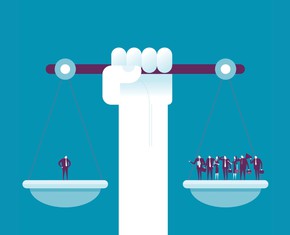The views expressed in our content reflect individual perspectives and do not represent the authoritative views of the Baha'i Faith.
“I know I have good motives—that love forms my personal ideology—but your ideology is based on hatred”—that’s the underlying assumption of the bias called motive attribution asymmetry, or MAA.
If you’ve never heard of it before, or even if you have, here’s a clear explanation of the MAA syndrome from a recent New York Times op-ed by Arthur C. Brooks, an author, musician, the former president of the conservative American Enterprise Institute, and now a faculty member of the Harvard Kennedy School and the Harvard Business School:
People often say that our problem in America today is incivility or intolerance. This is incorrect. Motive attribution asymmetry leads to something far worse: contempt, which is a noxious brew of anger and disgust. And not just contempt for other people’s ideas, but also for other people. In the words of the philosopher Arthur Schopenhauer, contempt is “the unsullied conviction of the worthlessness of another.”
The sources of motive attribution asymmetry are easy to identify: divisive politicians, screaming heads on television, hateful columnists, angry campus activists and seemingly everything on the contempt machines of social media. This “outrage industrial complex” works by catering to just one ideological side, creating a species of addiction by feeding our desire to believe that we are completely right and that the other side is made up of knaves and fools. It strokes our own biases while affirming our worst assumptions about those who disagree with us. – The New York Times, 3 March 2019.
Brooks has written a new book with an interesting title: Love Your Enemies: How Decent People Can Save America From the Culture of Contempt. Regardless of your political leanings, you can likely see the obvious truth in what he says: much of the American population, and of populations in many other countries as well, have developed a harmful habit of seeing people who disagree with them not as merely incorrect—but as wrong, worthless, defective and somehow sub-human.
This kind of bias, prejudice and polarization usually produces regrettable consequences. It rarely limits itself to words, accusations and angry finger-pointing, but often further degrades into prejudice, hatred and actual violence. Sooner or later, the verbal, political conflicts become less and less civil and more and more militant. Bias becomes hatred, and hatred leads to harm.
We have a thousand examples of this trend to teach us how not to behave, but we seem unable to learn from them.
So what if a new religion began to emerge around the world that taught us how to better see and treat other people? What if that new religion renewed the call to love and unity brought by all the former Faiths? What if that new religion emphasized the oneness of all humanity, the non-existence of evil, and a spiritual solution to our entrenched racial, social and national conflicts? What if that new religion brought us a fully-formed plan and structure to ensure a lasting peace on our planet?
Baha’is believe that the teachings of Baha’u’llah comprise that new religion:
This is the Day in which God’s most excellent favors have been poured out upon men, the Day in which His most mighty grace hath been infused into all created things. It is incumbent upon all the peoples of the world to reconcile their differences, and, with perfect unity and peace, abide beneath the shadow of the Tree of His care and loving-kindness. It behoveth them to cleave to whatsoever will, in this Day, be conducive to the exaltation of their stations, and to the promotion of their best interests. …
Soon will the present-day order be rolled up, and a new one spread out in its stead. – Baha’u’llah, Gleanings from the Writings of Baha’u’llah, pp. 6-7.
Only a new revelation from the Creator has the power to resolve our differences and solve our conflicts, the Baha’i teachings say:
Consider whether there exists anywhere in creation a principle mightier in every sense than religion, or whether any conceivable power is more pervasive than the various Divine Faiths, or whether any agency can bring about real love and fellowship and union among all peoples as can belief in an almighty and all-knowing God, or whether except for the laws of God there has been any evidence of an instrumentality for educating all mankind in every phase of righteousness. – Abdu’l-Baha, The Secret of Divine Civilization, p. 83.
Baha’is understand this principle—that religion can function as a unifying force, as a source of love, compassion, and peace—if it has the creative energy that new Faiths always bring to the world. Only that kind of unifying power can overcome the biases, the prejudices and the motive attribution asymmetry that so plagues our planet today:
Humanity is gripped by a crisis of identity, as various peoples and groups struggle to define themselves, their place in the world, and how they should act. Without a vision of shared identity and common purpose, they fall into competing ideologies and power struggles. Seemingly countless permutations of “us” and “them” define group identities ever more narrowly and in contrast to one another. Over time, this splintering into divergent interest groups has weakened the cohesion of society itself. Rival conceptions about the primacy of a particular people are peddled to the exclusion of the truth that humanity is on a common journey in which all are protagonists. Consider how radically different such a fragmented conception of human identity is from the one that follows from a recognition of the oneness of humanity. In this perspective, the diversity that characterizes the human family, far from contradicting its oneness, endows it with richness. Unity, in its Baha’i expression, contains the essential concept of diversity, distinguishing it from uniformity. It is through love for all people, and by subordinating lesser loyalties to the best interests of humankind, that the unity of the world can be realized and the infinite expressions of human diversity find their highest fulfilment. – The Universal House of Justice, to the Baha’is of the world, 18 January 2019.
















Comments
Sign in or create an account
Continue with Googleor